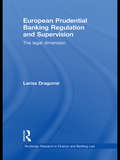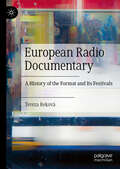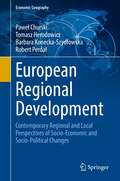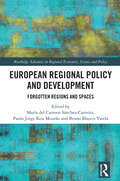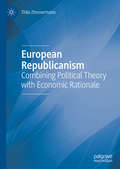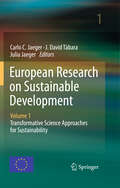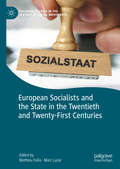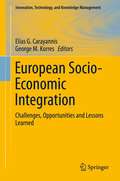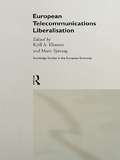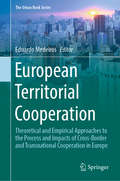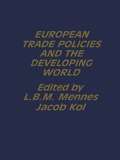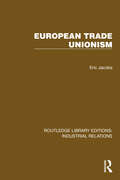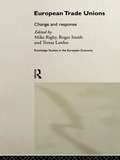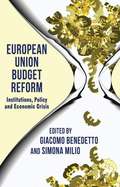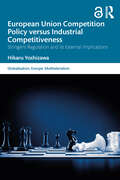- Table View
- List View
European Prudential Banking Regulation and Supervision: The Legal Dimension (Routledge Research in Finance and Banking Law)
by Larisa DragomirThe financial market events in 2007-2009 have spurred renewed interest and controversy in debates regarding financial regulation and supervision. This book takes stock of the developments in EU legislation, case law and institutional structures with regards to banking regulation and supervision, which preceded and followed the recent financial crisis. It does not merely provide an update, but anchors these developments into the broader EU law context, challenging past paradigms and anticipating possible developments. The author provides a systematic analysis of the interactions between the content of prudential rules and the mechanisms behind their production and application European Prudential Banking Regulation and Supervision includes discussions of the European banking market structure and of regulatory theory that both aim to circumscribe prudential concerns. It scrutinises the content of prudential norms, proposes a qualification of these norms and an assessment of their interaction with other types of norms (corporate, auditing and accounting, consumer protection, competition rules). It also features an analysis of the underpinning institutional set-up and its envisaged reforms, focusing on the typical EU concerns related to checks and balances. Finally, the book attempts to revive the debate on supervisory liability, in light of the developments discussed. This book will be of great value to all those interested in financial stability matters (practitioners, policy-makers, students, academics), as well as to EU law scholars.
European Radio Documentary: A History of the Format and Its Festivals
by Tereza RekováThis book studies the history and significance of radio documentaries in Europe, and the institutions that are specialized on this genre. Focused on the 50-year history of the International Feature Conference (an annual gathering of radio documentarians from around the world), the book discusses the Prix Europa, Prix Italia, the Third Coast International Audio Festival, and the HearSay Audio Arts Festival. The book tells the story of people who chose sound as their lifestyle and who spread their passion worldwide.
European Real Estate: Asset Class Performance and Optimal Portfolio Construction
by Gianluca Mattarocci Dilek PekdemirEuropean Real Estate.
European Real Estate: Asset Class Performance and Optimal Portfolio Construction
by Dilek PekdemirThis book provides a thorough overview of the European real estate Market. It evaluates the performance difference between countries and sectors, and what implications this has for optimal investment strategy within real estate asset classes.
European Regional Development: Contemporary Regional and Local Perspectives of Socio-Economic and Socio-Political Changes (Economic Geography)
by Paweł Churski Tomasz Herodowicz Barbara Konecka-Szydłowska Robert PerdałThis book offers a comprehensive overview of contemporary issues of regional development. It places particular emphasis on its socio-economic and socio-political determinants which accompany the problem of existing and ever-widening differences in the level of regional development in various parts of Europe. In order to diagnose the scale of those differences and to indicate the main forces behind the divergence of development, the authors propose an original systematisation of regional development factors, drawing attention to the need to consider them within the framework of present-day socio-economic megatrends. The proposed approach to the development factors is also used for the author's operationalisation of the concept of territorial capital, which is at the centre of regional place-based policy. The wide spatial aspect of the analysis (national and local) and its extensive temporal scope (2004-2019) yields unique results and creates an important element of added value for this book, which shows the regularities of the process of regional development in Europe at three spatial levels - pan-European, national and intra-regional. Furthermore, it indicates the challenges faced by regionalists who attempt to carry out research on different territorial levels with a diverse number of units (205 EU regions, 16 Polish voivodeships, 2,478 Polish local units) and extended observation periods (2004-2017). The solutions proposed by the authors, who show the potential of overcoming the barriers resulting from limited access to complete and comparable statistical data series, should be inspiring for many researchers. The unique results of direct research carried out on a large sample of respondents and entrepreneurs via diverse field research techniques constitute a valuable source of information on local conditions that impact contemporary development processes in less developed regions. Their value is even greater because they were carried out in a unique laboratory created by the authors for testing the regularity of formation and impact of socio-economic development factors in various locally determined conditions of this process. It consists of purposefully selected test units (LAU2). Located in a less developed region, they represent all growth types and functional test units identified in the course of the research. Consequently, the results obtained may be generalised and applied to other areas showing similar features of territorial capital. The monograph is addressed primarily to a wide group of regionalists connected with economic and social sciences as well as to practitioners involved in the implementation of development policies at various levels.
European Regional Policy and Development: Forgotten Regions and Spaces (Routledge Advances in Regional Economics, Science and Policy)
by María del Carmen Sánchez-Carreira Paulo Jorge Reis Mourão Bruno Blanco-VarelaThe shortcomings of traditional regional policies led to a major policy. Thus, regions have become more active in the design and implementation of policies, following a bottom-up approach and involving the participation of the local community in strategic planning, as opposed to the traditional top-down method. This book addresses regional development theories and policies, with a special focus on forgotten places, and raises emerging questions about recent theoretical advances, as well as trends and challenges in the field. It examines two main and related issues: the crucial role of regional actors for development and the role of Forgotten Spaces. It emphasizes the spatial/territorial approaches from different theoretical perspectives, underlining place-based approaches and compares the experiences of both successful and failed cases, attempting to identify lessons and policy recommendations, as well as adding empirical evidence to this field. The different cases presented, which focus on Forgotten Spaces, allow the reader to assess the role of different actors for regional development as well as some sectoral approaches. While there is a clear focus on European countries with different geographical, institutional and sociocultural characteristics, the book also examines good and bad examples of regional development and policies related to forgotten places from different regions worldwide, including developed and developing countries. The book benefits from contributions from over 20 authors from different nationalities, and a rich diversity of case studies, approaches and methods of discussion. The authors discuss practical examples and more complex theoretical approaches, involving techniques of spatial analysis, spatial econometrics, social networks, content analysis as well as regional planning techniques. The book will appeal to an interdisciplinary audience and will provide academicians, politicians, and policy designers with original and detailed analyses.
European Republicanism: Combining Political Theory with Economic Rationale
by Thilo ZimmermannThis book presents current theories of European integration, such as federalism, neo-functionalism and liberal intergovernmentalism with their strengths and weaknesses. It is then argued that the combination of republican theory with public good theory, the res publica of public goods, could better explain European integration. Public good theory has, however, to be adopted in order to make it applicable to European republicanism. Finally, the book demonstrates how this new framework can influence further academic debates, such as on sovereignty and monetary integration, externalities of a common European market and the driving force of European integration. It is maintained that as the republican approach does not follow a pure economic logic, there remains space for political considerations and motivations.In this topical and interdisciplinary book, the author combines many important strings of European integration theory, history, economics and political sciences, which are clearly brought together into a coherent analytical discourse. Its strength is the interdisciplinary interaction between politics and economics, as well as theoretical and practical issues which are of high relevance for public debate in Europe. This book will be of interest to scholars and students interested in economic integration, as well as history and political philosophy.
European Research on Sustainable Development
by J. David Tàbara Carlo C. Jaeger Julia JaegerThis book provides the reader with a state-of-the-art view of research on sustainable development. Its emphasis lies on the transformative dimension of this research: sustainable development can only be realized through a far-reaching transformation of the situation humankind finds itself in at the beginning of the third millennium. The contributions are written by leading world experts in the conceptualisation and actual practice of sustainable development. The book provides a timely overview of ideas and methods as well as a variety of original learning examples on the most innovative approaches on sustainability science.
European Ship Recycling Regulation
by Urs Daniel EngelsThis study provides an in-depth analysis of the Hong Kong Ship Recycling Convention as adopted in May 2009 and a thorough analysis of the overall status quo of ship recycling regulations. It investigates the lack of sufficient ratifications of the Convention from both a legal and an economic perspective. The first part of the study focuses on the history of the Convention's entry-into-force provision and the rationale behind it. Due to the fact that this provision provides a considerable additional obstacle to the Convention's becoming legally binding, in the second part the focus of the work shifts to unilateral action in this field. An overview of the legal environment of European ship recycling legislation is followed by an analysis and evaluation of a number of proposals by the European Commission attempting to tackle the problems of current ship recycling procedures. With a particular emphasis on (planned) European measures in this regard, the analysis' overall message is one of cautious optimism.
European Socialists and the State in the Twentieth and Twenty-First Centuries (Palgrave Studies in the History of Social Movements)
by Mathieu Fulla Marc LazarThis edited volume promotes a comparative and transnational approach to the complex and ambiguous relationship between West European socialism and the contemporary state over the longue durée. It encourages a better understanding of socialism while also casting an original light on the history of the contemporary state in Europe. Socialists have been a prime political force since the late nineteenth century through to the present. Through their strength, their presence at the heart of societies, their dynamism, inventiveness, and influence, they have left their mark on the European physiognomy and helped to forge part of its identity. This is particularly true where the welfare state is concerned, and the role played by the state in constructing, embedding, and extending this social model. Surprisingly, there has been no research aiming to systematically analyse the relationship between socialism and the state. This volume fills a gap in knowledge by rejecting the media simplification and political polemic maintained by opponents of socialism – and sometimes by socialists themselves – which systematically links socialism with “statism”. It focuses on numerous case studies involving France, Italy, Spain, Greece, Austria, Germany, Belgium, the United Kingdom and Scandinavia, and highlights the diversity of organisations within European socialism. Ultimately, this book demonstrates that the fate of this political culture depends on the socialist parties themselves but also on any new configurations that states may assume. Conversely, the future of states will also depend partly on the choices made by socialists, if they still exist and still have the means to shape decisions and make their voices heard.
European Socio-Economic Integration
by Elias G. Carayannis George M. KorresEconomic integration is one of the most noteworthy issues in international economic policy at the end of the twentieth century. The recent examples of the European Union (EU) and the North American Free Trade Association (NAFTA) have raised important questions about the economic integration process and the possible establishment of economic unions in other parts of the world. Against the backdrop of the financial crisis in Europe and prospects of increasing integration in Asia, this volume showcases research from an international array of researchers to provide a basic understanding of the current issues, problems, challenges, and opportunities for achieving integration, addressing both empirical and theoretical aspects of such topics as monetary union, social policy reform and social union, public finance and technology policy. The chapters in Part 1 are focused primarily on economic issues, while Part 2 covers on social policy, the welfare state, and political reforms, with a particular emphasis on the European Union. Among the questions addressed: What are the main determinants and implications for socio-economic integration?How can economic policy influence the growth and integration process?Why is innovation important for regional economic development?What has been the policy response so far and what lessons have we learned from it?And finally, what are our action lines for the future?
European Solidarity in Action and the Future of Europe: Views from the Capitals (The Future of Europe)
by Michael Kaeding Paul Schmidt Johannes PollakThis book sheds light on how member states and EU neighbours reacted to the COVID-19 pandemic through the lens of European solidarity, what they expect from the EU, and other member states, and how they are ready to contribute to common action. The volume reveals how European countries experience and perceive solidarity from the EU and towards the EU in different policy dimensions, such as intra-EU mobility, healthcare and financial and economic aspects of Europe’s recovery. The book offers national perspectives and perceptions of solidarity and concrete aspects in different policy areas. It includes a Foreword by the Vice-presidents of the European Parliament Katarina Barley and Othmar Karas.
European Solidarity: An Analysis of Debates on Redistributive Policies in France and Germany (Contributions to Political Science)
by Raphaela HobbachThis book addresses the central question of European solidarity in the face of a multitude of crises in Europe and focuses on its discursive manifestation in public debates. It is the first to systematically examine national debates on redistributive policies in the EU and the role of European solidarity within them by analysing French and German parliamentary debates on redistributive EU policies during the euro crisis and the migration crisis. By doing so, the book addresses the question of how relevant the idea of European solidarity is when redistributive policies in the EU are discussed at the national level and examines the conditions under which it is ascribed more or less relevance. Moreover, the book reveals that what European solidarity actually means in practice is often highly contested.
European Telecommunications Liberalisation (Routledge Studies in the European Economy #Vol. 10)
by Kjell A. Eliassen Marit SjøvaagThis book examines the process and consequences of telecommunications liberalisation in the context of an ever closer European Union. The creation of a single market for telecommunications and of a wider European single market mirror one another. Telecommunications are also something of a test case for the privatisation process, as this sector has traditionally been a state monopoly. The volume approaches the European experience from three angles: * the politics of regulation and the process of liberalisation in the EU (including case studies of the UK, France, and Germany) * increasing global economic interdependence makes international comparisons essential, and the volume compares the EU experience with that of the Czech Republic, Israel and Thailand * the consequences of technology and continuous innovation
European Territorial Cooperation: Cohesion, Development, Impact Assessment And Cooperation (Routledge Advances In European Politics Ser.)
by Eduardo MedeirosThis book fills an existing academic literature gap by providing a sound and synthetic analysis on the process of European Territorial Cooperation over the last 30 years. This follows from the support from the former EU INTERREG Community Initiative, since 1989, later transformed into the second main goal of EU Cohesion Policy, by 2007: European Territorial Cooperation - ECT. In order to present the ECT process in a more comprehensive manner, and to be the main literature reference regarding this process in the decades to come, this book is divided into four different sections and 12 chapters. The first section summarizes the main impacts and added-value from ETC experiences while proposing the elevation of the ETC goals within EU Cohesion Policies. The second section addresses the process of cross-border cooperation, and namely its impact in reducing border obstacles and supporting ever growing number of cross-border entities. The third section elaborates on the second most important ETC process (transnational cooperation) with a similar approach. Finally, a last section debates the future scenarios for this process in Europe.
European Tourism Planning and Organisation Systems
by Carlos Costa Emese PanyikThis book provides a systematic, country-by-country analysis of tourism policy, planning and organisation in the EU. Its main objective is to explore 21st century policy responses to the global challenges shaping tourism planning and organisation systems in the EU. The book offers a new critical approach to comparative policy analysis of EU member states and focuses on six key themes: territory, actors and structures, economics, policy, methods and techniques and vision. The book is designed primarily for undergraduate and postgraduate tourism students and researchers. The book will also be useful for industry practitioners who would like to engage in the theoretical principles and the conceptualisation of planning and organisation systems.
European Trade Policies and Developing Countries
by L.B.M. Mennes Jacob KolFirst published in 1987. Routledge is an imprint of Taylor & Francis, an informa company.
European Trade Unionism (Routledge Library Editions: Industrial Relations)
by Eric JacobsEuropean Trade Unionism (1973) examines the differences between the trade union movements of Europe, alongside noting their similarities. Trade unions in Europe differ in their political and religious allegiances, their membership and structure, their success or failure – but they have much in common too, not least their problems.
European Trade Unions: Change and Response (Routledge Studies in the European Economy #Vol. 8)
by Roger Smith Mike Rigby Teresa LawlorThis volume:* explores the extent to which European Industrial Relations systems are converging *explores what has been the unions' reaction to changes in the economic environment * includes studies from key sectors: electronics, food manufacturing, banking and public administration * compares trade unions in these sectors in five of Europes most important economies: Germany, the UK, Spain, Italy and Denmark
European Union - European Industrial Relations?: Global Challenge, National Development and Transitional Dynamics
by Hans-Wolfgang Platzer Wolfgang E. LecherThis book explores the prospects for the emergence of a distinctly European pattern of industrial relations, in which the European-level organisations representing employers and trade unions gain in importance vis-a-vis their national organisations. In particular, the impact of the 'Social Chapter' to the Maastricht Treaty is considered. The study
European Union Budget Reform
by Giacomo Benedetto Simona MilioA tension between (richer) contributing Member States and (poorer) recipient Member States has always characterised the history of the budget of the European Union, the politics of which has often turned fraught. This volume evaluates the prospects for major change to expenditure and the structure of the budget for the period starting in 2014.
European Union Competition Policy versus Industrial Competitiveness: Stringent Regulation and its External Implications (Globalisation, Europe, and Multilateralism)
by Hikaru YoshizawaThe book examines whether EU competition policy is applied fairly and consistently to EU and non-EU firms despite persistent political pressure from member states for a relaxation of the rules and deals with the dilemma of regional organisations in the global political economy. Focussing on the EU’s desire to achieve balance between the promotion of market competition and the enhancement of international competitiveness, the book explores the validity of its attempts successfully to ensure a ‘stringent competition policy’ which is nationality-blind and comparatively strict. Finally, it shows that the competition-competitiveness dilemma remains unresolved because the EU’s capability to set global regulatory standards is constrained by competition and the need to engage in multilateral forums, such as the WTO and the International Competition Network. This book will be of key interest to scholars and students of European Union studies, EU competition law and policy, EU external action and more broadly to global governance, international political economy and international relations.
European Union Competition Policy versus Industrial Competitiveness: Stringent Regulation and its External Implications (ISSN)
by Hikaru YoshizawaThe book examines whether EU competition policy is applied fairly and consistently to EU and non-EU firms despite persistent political pressure from member states for a relaxation of the rules and deals with the dilemma of regional organisations in the global political economy. Focussing on the EU’s desire to achieve balance between the promotion of market competition and the enhancement of international competitiveness, the book explores the validity of its attempts successfully to ensure a ‘stringent competition policy’ which is nationality-blind and comparatively strict. Finally, it shows that the competition-competitiveness dilemma remains unresolved because the EU’s capability to set global regulatory standards is constrained by competition and the need to engage in multilateral forums, such as the WTO and the International Competition Network. This book will be of key interest to scholars and students of European Union studies, EU competition law and policy, EU external action and more broadly to global governance, international political economy and international relations.The Open Access version of this book, available at http://www.taylorfrancis.com, has been made available under a Creative Commons Attribution-Non Commercial-No Derivatives 4.0 license.
European Union Corporate Tax Law
by Christiana Hji PanayiHow does EU law affect Member State corporate tax systems and the cross-border activities of companies? This unique study traces the historical development of EU corporate tax law and provides an in-depth analysis of a number of issues affecting companies, groups of companies and permanent establishments. Existing legislation, soft-law and the case-law of the Court of Justice are examined. The proposed CCCTB Directive and its potential application through enhanced co-operation are also considered. In addition to the tax issues pertaining to direct investment, the author examines the taxation of passive investment income, corporate reorganisations, exit taxes and the restrictive effect of domestic anti-abuse regimes. By doing so, the convergences and divergences arising from the interplay of EU corporate tax law and international tax law, especially the OECD model, are uncovered and highlighted.
European Union Corporate Tax Law (Cambridge Tax Law Series)
by Christiana HJI PanayiHow does EU law affect Member State corporate tax systems and the cross-border activities of companies? This book traces the historical development of EU corporate tax law and provides an in-depth analysis of a number of issues affecting companies, groups of companies, and permanent establishments. Christiana HJI Panayi examines existing legislation, soft law, and the case law of the Court of Justice, as well as the Commission's burgeoning external tax policy initiatives. The book not only explores the tax issues pertaining to direct investment, but also analyzes the taxation of passive investment income, corporate reorganisations, exit taxes, and the treatment of anti-abuse regimes. Through this careful analysis, the book highlights the convergences and divergences arising from the interplay between EU corporate tax law and international tax law, especially the OECD model tax convention. This second edition also reviews developments in the context of the State aid prohibition and high-profile cases on tax rulings.
